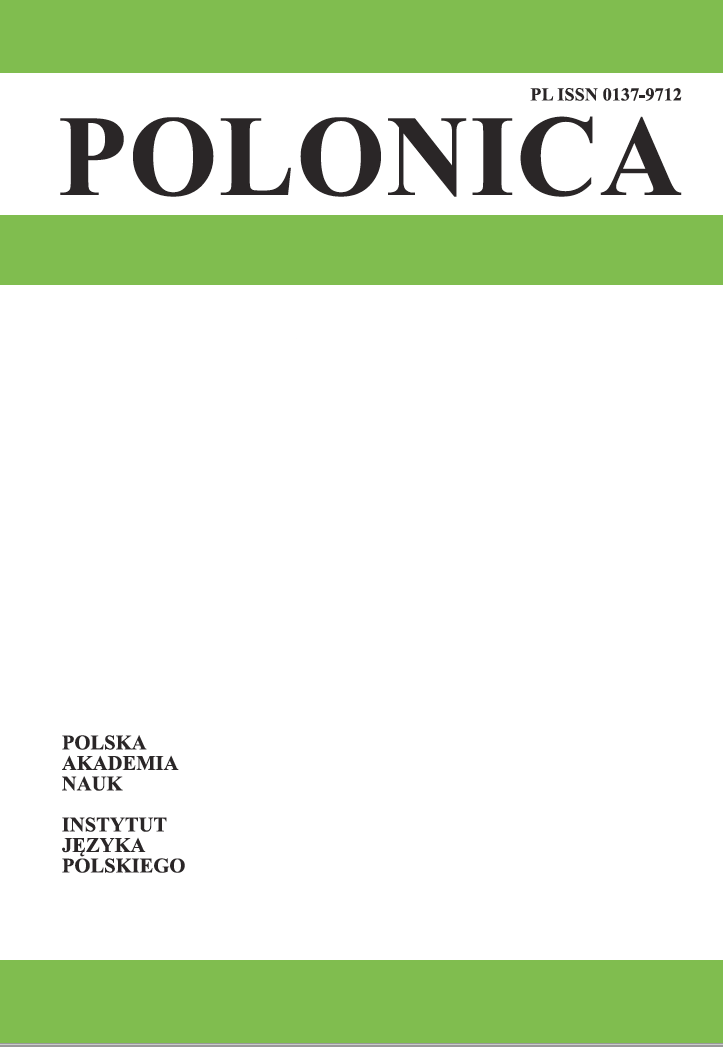Abstract
The paper is an outline of the issue of Neo-Latin vocabulary in the context of dictionaries covering words taken from early-modern Latin texts. Apart from the “Dictionary of Renaissance Latin from prose sources” by René Hoven and some very useful minor Neo-Latin word-lists scholars dealing with the works of 16th and 17th century do not have specialized Latin lexicons on mainly Renaissance and Baroque literature. Even dictionaries on classical, mediaeval or ecclesiastical Latin sometimes are helpful only to some extent. The author proposes preparing the early modern Neo-Latin dictionary mainly from the works by the Polish authors.
References
A Glossary of Later Latin To 600 A.D., 1957, ed. A. Souter, Oxford.
Corruptae Latinitatis index or a Collection of barbarous words and phrases which are found in the works of the most celebrated modern writers in Latin [...], 1755, ed. W. Massey, London.
Crocus C., 1536, Farrago sordidorum verborum, [w:] Paraphrasis seu potius Epitome inscripta d. Erasmo Roterod. luculenta iuxta ac brevis in Elegantiarum libros Laurentii Vallae, ab ipso iam recognita, cum Gallica tum dictionum, tum locutionum expositione. Cui addita est Farrago sordidorum verborum sive Augiae stabulum repurgatum per Cornelium Crocum, Parisiis.
Czerenkiewicz M., Ryczek W., 2013, Studia (neo)Latina rediviva. Kilka uwag i postulatów odnoś - nie do neolatynistyki, Terminus, t. 15, z. 3 (28), s. 335–358.
Domański J., 2011, Scholastyka i początki humanizmu w myśli polskiej XV wieku, Warszawa. Glossarium mediae et infimae Latinitatis conditum a Carolo Dufrense domino Du Cange, auctum a monachis ordinis S. Benedicti, cum supplementis integris d. P. Carpenterii, Adelungii, aliorum suisque digessit G. A. L. Henschel, [...] editio nova aucta a Léopold Favre, t. 8: T–Z, 1887, Du Cange et alii, Niort.
Erasmus Rotterodamus, 1643, Dialogus de recta Latini Graecique sermonis pronuntiatione, Lugduni Batavorum.
Helander H., 2001, Neo-latin Studies: Significance and Prospects, Symbolae Osloenses 76, s. 5–44.
Hoven R., 1994, Lexique de la Prose Latine de la Renaissance, Leiden–New York–Köln. — 2006, Lexique de la prose latine de la Renaissance, avec la collaboration dé Laurent Grailet, deuxième édition revue et considérablement augmentée, English Translation by Coen Maes, revised by Karin Renard-Jadoul, Leiden–Boston.
Janson T., 2004, A Natural History of Latin, translated and adapted into English by Merethe Damsgård Sørensen and Nigel Vincent, Oxford.
Korpanty J., Wo l a n i n H., 2001, Przedmowa, [w:] Słownik łacińsko-polski. A–H, t. 1, red. naukowy J. Korpanty, Warszawa.
Lexicon eorum vocabulorum quae difficilius Latine redduntur, ed. III, 1955, ed. A. Bacci, Roma.
Lexicon Morganianum (Morgan Latin Lexicon): http://www.wyomingcatholiccollege.com/faculty-pages/ patrick-owens/index.aspx (dostęp: 21.06.2015).
Lexicon recentis Latinitatis, editum cura operis fundati cui nomen „Latinitas”, moderator Carolus Egger, vol. I, A–L, 1992, in Urbe Vaticana.
Lexicon recentis Latinitatis, editum cura operis fundati cui nomen „Latinitas”, moderator Carolus Egger, vol. II, M–Z, 1997, in Urbe Vaticana.
Petrasancta S., 1638, Tesserae gentilitiae [...] ex legibus fecialium descriptae, Romae.
Plezia M., 2011, Projekt zasad redagowania słownika polskiej łaciny średniowiecznej, [w:] M. Plezia, Scripta minora. Łacina średniowieczna i Wincenty Kadłubek, Kraków, s. 23–46.
Ramminger J., Neulateinische Wortliste. Ein Wörterbuch des Lateinischen von Petrarca bis 1700: http://ramminger.userweb.mwn.de/neulateinische_wortliste.htm (dostęp: 04.05.2014).
— 2011, The role of classical, medieval, and Renaissance lexicography in the development of neo-Latin: some examples from the Latin works of Marcus Marulus, Studi Umanistici Piceni XXXI, s. 75–86, por. http://ramminger.userweb.mwn.de/biblio_lrz/ramminger_marulus_lexicography.pdf (dostęp: 30.09.2014).
Sacré D., 2010, Instrumentum lexicographum, Humanistica Lovaniensia. Journal of Neo-Latin Studies, 59, s. 467–469.
Stroh W., 2013, Łacina umarła, niech żyje łacina! Mała historia wielkiego języka, tłum. A. Arndt, wstęp E. Wesołowska, Antyk u Tuwima — A. Arndt, Poznań.
Sondel J., 2009, Przedmowa, [w:] Słownik łacińsko-polski dla prawników i historyków, Kraków.
Swieżawski S., 2002, Między średniowieczem a czasami nowymi. Sylwetki myślicieli XV wieku, War - szawa.
Vander Poel M., 2007, recenzja słownika: R. Hoven, Lexique de la Prose Latine de la Renaissance, Leiden–Boston, 2006: http://bmcr.brynmawr.edu/2007/2007-03-12.html (dostęp: 05.05.2014).
